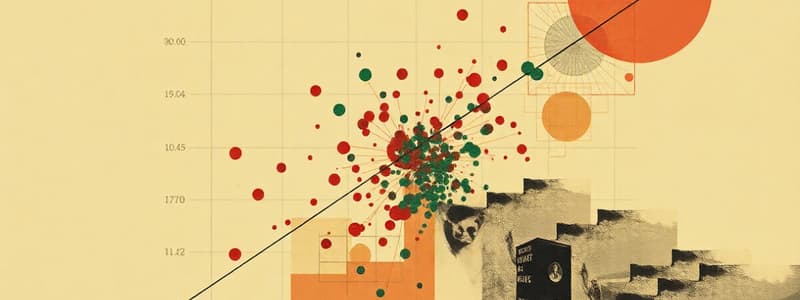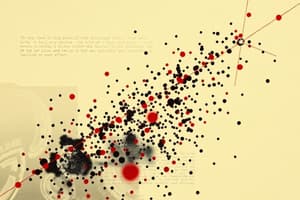Podcast
Questions and Answers
What indicates a positive correlation when using Pearson's Correlation Coefficient?
What indicates a positive correlation when using Pearson's Correlation Coefficient?
- A decrease in one variable is associated with an increase in the other.
- No relationship exists between the two variables.
- An increase in one variable is linked to a decrease in the other.
- Both variables increase or decrease together. (correct)
Which of the following values of Pearson’s Correlation Coefficient indicates a weak correlation?
Which of the following values of Pearson’s Correlation Coefficient indicates a weak correlation?
- 0.9
- 0.5
- 0.76
- 0.15 (correct)
What does the 'line of best fit' represent in a scatter diagram?
What does the 'line of best fit' represent in a scatter diagram?
- The line that minimizes the distance to all points. (correct)
- The average of all plotted points.
- A prediction of future values based on the data.
- The exact relationship between the two variables.
What outcome is indicated if the value of Pearson’s correlation coefficient, r, equals zero?
What outcome is indicated if the value of Pearson’s correlation coefficient, r, equals zero?
Which method is a common approach to determine the line of best fit besides drawing it visually?
Which method is a common approach to determine the line of best fit besides drawing it visually?
What does a negative Pearson’s correlation coefficient indicate?
What does a negative Pearson’s correlation coefficient indicate?
What is the primary basis for determining how to classify the strength of correlation using the value of r?
What is the primary basis for determining how to classify the strength of correlation using the value of r?
When plotting a scatter diagram, which variable is typically represented on the vertical axis?
When plotting a scatter diagram, which variable is typically represented on the vertical axis?
What is the primary purpose of computing the Spearman Rank correlation coefficient?
What is the primary purpose of computing the Spearman Rank correlation coefficient?
Which of the following scenarios is NOT suitable for using Spearman Rank correlation?
Which of the following scenarios is NOT suitable for using Spearman Rank correlation?
In calculating the Spearman Rank correlation, what does the 'di' represent?
In calculating the Spearman Rank correlation, what does the 'di' represent?
What must be done if there are instances of the same value when ranking the data for Spearman correlation?
What must be done if there are instances of the same value when ranking the data for Spearman correlation?
What does the notation Rs typically represent in correlation studies?
What does the notation Rs typically represent in correlation studies?
Study Notes
Correlation
- A correlation is a mutual relationship or connection between two or more things.
- A scatter diagram is a common way to plot correlations.
Scatter Diagram
- A scatter diagram uses rectangular coordinates to plot two quantitative variables.
- One variable is considered independent (X) and is usually plotted along the bottom (horizontal) axis.
- The other is considered dependent (Y) and is usually plotted along the vertical axis.
Relationship Types
- Positive relationship: An increase in one variable is associated with an increase in the other.
- Negative relationship: An increase in one variable is associated with a decrease in the other.
- Non-linear association: The relationship between the variables is not a straight line.
- No relationship: The variables show no connection.
Line of Best Fit
- The “line of best fit” (regression line) is drawn so that the points are evenly distributed on either side of the line.
- The tighter the plots are to the line of best fit, the stronger the correlation.
Pearson's Correlation Coefficient
- Pearson’s Correlation Coefficient (r) measures the nature and strength of the relationship between two interval/ratio variables.
- Relationships must be linear for this method to work, so always plot a scatter diagram first.
Interpretation of 'r'
- Sign of 'r':
- A positive sign (+) indicates a direct relationship.
- A negative sign (-) indicates an inverse or indirect relationship.
- Value of 'r':
- The value of 'r' ranges between -1 and +1.
- r = 0: No association.
- 0 < r < 0.25: Weak correlation.
- 0.25 ≤ r < 0.75: Intermediate correlation.
- 0.75 ≤ r < 1: Strong correlation.
- r = 1: Perfect correlation.
Spearman Rank Correlation Coefficient
- A non-parametric measure of correlation used when variables are:
- Both quantitative.
- Both qualitative ordinal.
- One quantitative and one qualitative ordinal.
- Procedure:
- Rank the values of 'x' from 1 to n.
- Rank the values of 'y' from 1 to n.
- If there are ties (same values), add the missing rank positions and divide by the number of missing ranks.
- Compute the difference (di) for each pair of observations by subtracting the rank of Yi from the rank of Xi.
- Square each di and compute ∑di2 (sum of squared differences).
- Rs (Spearman's Rank Correlation Coefficient) denotes the magnitude and nature of association, interpreted similarly to Pearson's 'r'.
Kendall's Tau
- Suitable when:
- Variables are in different forms (nominal, ordinal, interval/ratio).
- Association is non-linear.
Studying That Suits You
Use AI to generate personalized quizzes and flashcards to suit your learning preferences.
Description
This quiz explores the concepts of correlation and scatter diagrams in statistics. Test your understanding of positive, negative, and non-linear relationships, as well as the line of best fit. Perfect for students looking to solidify their knowledge in data analysis.




